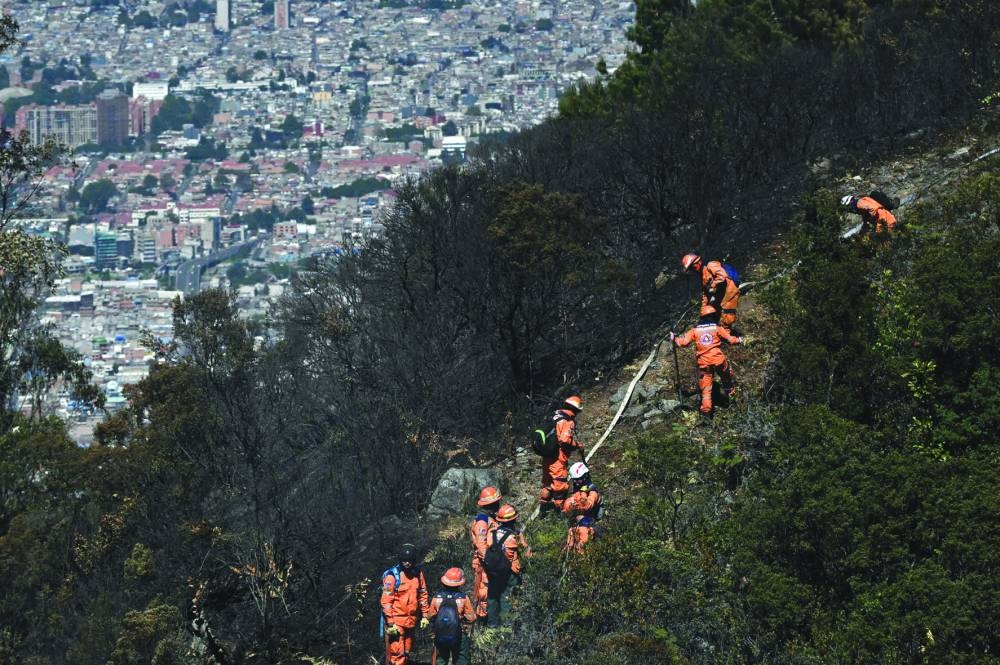Colombia has appealed for international help as it battled dozens of forest fires burning vast swathes of the country and covering the capital in a blanket of smoke.
As hundreds of firefighters and volunteers battled flames on the mountains around Bogota for a fourth consecutive day, schools and a university in the worst affected areas scrapped in-person classes and dozens of flights from the El Dorado international airport were delayed or cancelled due to poor visibility.
Hundreds of blazes have already been extinguished countrywide in recent weeks amid record temperatures and dry conditions linked to the El Nino weather phenomenon.
More than 6,600 hectares (16,300 acres) of vegetation have been destroyed so far, according to the National Disaster Risk Management Unit (UNGRD).
Thirty-one fires were still raging in five regions of Colombia on Thursday – at least three of them around Bogota.
President Gustavo Petro said he had ordered the “activation of international aid protocols” and announced that offers of help have already come from the United States, Chile, Peru and Canada.
He has declared a natural disaster, allowing funds to be diverted from other budget items towards containing the blazes.
In the departments of Santander and Cundinamarca – of which Bogota is the capital – fires have consumed about 600 hectares of forest, officials said.
Authorities have warned of a “significant deterioration” in air quality in the city of some 8mn people, with Bogotans counselled against outdoor physical activity.
Many pedestrians wore facemasks.
“I am very worried ... My God! It’s terrible,” resident Andrea Gomez, 48, told AFP.
The city council advised citizens to close their windows and leave wet towels under their doors, and Mayor Carlos Fernando Galan said he was in touch with the Spanish ambassador regarding possible assistance as the situation “can become more critical”.
Hundreds of wild animals including raccoon-like animals called coatis, porcupines, birds and frogs have been fleeing the heat and flames in one of the world’s most biodiverse countries, and spotted in growing numbers in built-up areas.
Citizens have mobilised to bring snacks and drinks to firefighters, and sharing appeals on social media to leave out water for distressed animals.
Images shared by Colombia’s Civil Aviation Authority showed a dense white smoke cloud engulfing the control tower at El Dorado, where airport officials said 48 flights were cancelled on Thursday, 16 deviated to other airports and many others delayed.
Petro said global warming was aggravating the effects of El Nino – a phenomenon typically associated with increased temperatures worldwide, drought in some parts of the world and heavy rains in others.
“This may be the hottest year in the history of mankind,” said the president, calling on “every mayor, every governor and the national government” to prioritise water supplies.
Sixty-two municipalities were facing water stress, he added.
Nine towns in the north, centre and east of Colombia posted record temperatures this week of up to 40.4° Celsius (105° Fahrenheit) in what is typically the coldest month in Colombia.
Some 300 firefighters, soldiers, police officers and volunteers with the backing of water-bearing helicopters and drones were fighting the fires around the capital on Thursday, according to Galan.
They were also using hoes, rakes and machetes to create firebreaks on the sloping hills bordering the sprawling capital.
Soldier Gustavo Andres Betancourt described challenging conditions.
“Some hotspots are still active. They are being contained, but at night, due to the high altitude and the winds, they start up again, creating new fires,” he said.
The Ideam meteorology institute said on Thursday that more than 87% of the country was at “maximum risk” for fires.
Hot, dry conditions are expected to last through June, according to forecasters.
Colombia has put out some 204 fires this month – around eight per day – and 25 fires continued to burn, according to a report from the environment ministry.
Almost half of the 2tn peso budget ($508mn) for addressing issues caused by El Nino, like fighting fires, has already been spent, the report said.
Earlier this month, Colombia’s Environment Minister Susana Mohamed warned the country was at grave risk of forest fires that could worsen deforestation.
Climate change has been blamed for driving a record drought that has hit all nine countries in the Amazon basin – including Colombia – according to a study on Wednesday which found global warming made the drought 30 times more likely.
The drought is expected to worsen this year, scientists told Reuters in 2023.

Members of Colombian Civil Defence work to put out a forest fire near Bogota.
